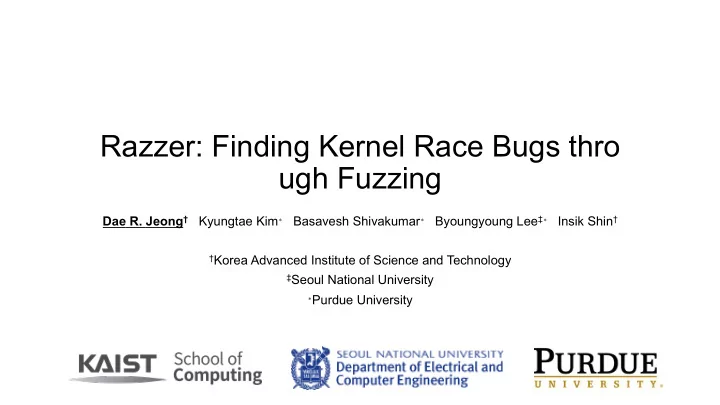

Razzer: Finding Kernel Race Bugs thro ugh Fuzzing Dae R. Jeong † Kyungtae Kim ∗ Basavesh Shivakumar ∗ Byoungyoung Lee ‡ ∗ Insik Shin † † Korea Advanced Institute of Science and Technology ‡ Seoul National University ∗ Purdue University
Kernel Vulnerability Attacker can control the entire system 2
Fuzzing: Focused to Extend Coverage • Fuzzing • One of the most practical approaches in finding vulnerabilities • Coverage-guided fuzzing • It gathers interesting inputs that extend code coverage. • The more coverage, the more vulnerabilities 3
Race Bugs • Assumption: Race condition between two threads • Race condition occurs if following three conditions meet • Two instructions access the same memory location • At least one of two is a write instruction • These two are executed concurrently • If a race occurs, the computational results may vary depending on the execution order • A race vulnerability is caused by the execution order unintended by dev elopers. 4
Inefficient Fuzzing for Race Bugs • Traditional fuzzers are inefficient to find race bugs • Instructions should be executed within a specific time window • Called as race window • Execution orders are not determined by the fuzzer • Execution orders are determined by the kernel scheduler 5
Inefficient Fuzzing for Race Bugs: Examp le Thread 1 Thread 2 Syscall: open() Syscall: rename() len = strlen( file_name ); buf = kmalloc(len); Race strcpy( file_name , longer_name); window file_name is longer than strcpy(buf, file_name ); the allocated buffer Buffer overflow! 6
Inefficient Fuzzing for Race Bugs: Syzkall er • Syzkaller • A kernel syscall fuzzer developed by Google • Run Syzkaller to find three race bugs with limited set of syscalls • CVE-2016-8655 • CVE-2017-17712 • CVE-2017-2636 • None of CVEs was found within 10 hours • Traditional fuzzing is inefficient to find race bugs • Razzer can find all of them within 7~30 minutes 7
Our approach: Razzer Thread interleaving Code coverage len = strlen( file_name ); buf = kmalloc(len); strcpy( file_name , longer_name); strcpy(buf, file_name ); 8
Our approach: Razzer Thread 1 Thread 2 Syscall: open() Syscall: rename() len = strlen( file_name ); buf = kmalloc(len); Race B strcpy( file_name , longer_name); window P B strcpy(buf, file_name ); P Buffer overflow! 9
Design Overview Offline ana Online lysis testing Over-approximated Multi-thread Source data races input code Static analysis Single-thread Multi-thread fuzzing fuzzing 10
Design Overview Offline ana Online lysis testing Over-approximated Multi-thread Source data races input code Static analysis Single-thread Multi-thread fuzzing fuzzing 11
Static Analysis • Identifying instructions that may race • Teaching Razzer where to install breakpoints to trigger race • Inclusion-based points-to analysis • Also known as Andersen-style points-to analysis • This static analysis certainly has false positives • Next phases (fuzzing) takes care of this issue because it is “fuzzing” 12
Static Analysis: Example Source code Razzer identified 3.4M race candidates over the entire Linux kernel Read len = strlen( file_name ); buf = kmalloc(len); Write strcpy( file_name , longer_name); Read strcpy(buf, file_name ); 13
Design Overview Offline ana Online lysis testing Over-approximated Multi-thread Source data races input code Static analysis Single-thread Multi-thread fuzzing fuzzing 14
Single-thread Fuzzing Thread 1 Single-thread Syscall: open() input len = strlen( file_name ); … buf = kmalloc(len); open() strcpy(buf, file_name ); rename() … Syscall: rename() strcpy( file_name , longer_name); 15
Transformation to Multi-thread Input Thread 2 Thread 1 … len = strlen( file_name ); buf = kmalloc(len); open() B strcpy( file_name , P rename() B longer_name); strcpy(buf, file_name ) P ; … 16
Design Overview Offline ana Online lysis testing Over-approximated Multi-thread Source data races input code Static analysis Single-thread Multi-thread fuzzing fuzzing 17
Multi-thread Fuzzing CPU 2 CPU 1 Thread 1 Thread 2 len = strlen( file_name ); … buf = kmalloc(len); Hypercall Hypercall B strcpy( file_name , P Syscall n Syscall longer_name); B strcpy(buf, file_name ) m … P ; Guest VM Hypervisor strcpy( file_name , other_name); strcpy(buf, file_name ); Two threads access the same memory è A race condition is occurred Thread 2 Thread 1 18
Implementation • Static analysis • Implemented using SVF which is based on LLVM compiler suite • Single-thread/Multi-thread fuzzing • Implemented based on Syzkaller • Deterministic scheduler • Implemented using QEMU/KVM • Exposing hypercall interfaces to support per-core breakpoint 19
Evaluation • 30 new races in the Linux kernel • 15 were fixed Use-after-free Heap overflow Double free
Evaluation: Comparison with Syzkaller • Run Razzer and Syzkaller with limited set of syscalls • Razzer found race bugs 23~85 faster than Syzkaller • Razzer found 3 race bugs within short time • Syzkaller didn’t find 3 race bugs within 10 hours Syzkaller Razzer Race bugs # of exec Time Found # of exec Time Found CVE-2016-8655 29 M 10 hrs X 1,170 K 26 min ✓ CVE-2017-17712 37 M 10 hrs X 807 K 18 mins ✓ CVE-2017-2636 5 M 10 hrs X 246 K 7 mins ✓ 21
Conclusion • Razzer, a new fuzzer focusing on race bugs • Taming non-deterministic behavior of races • Combining static analysis and fuzzing • Source code (by May 25, 2019) • https://github.com/compsec-snu/razzer 22
Thank you Dae R. Jeong threeearcat@gmail.com
Recommend
More recommend